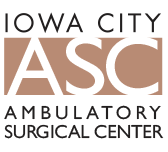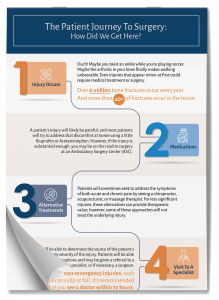ACL RECONSTRUCTION
For parents and athletes alike, ACL injuries can be excruciating. For a parent, the suddenness of the trauma can be alarming–and it’s difficult to know that a long rehabilitative road is ahead for your child athlete.
For an athlete, the sudden pain is shocking, and the loss of mobility can be extremely frustrating.
Successful ACL reconstruction surgery can help athletes return to high-level competition and non-athletes enjoy greater knee stability. A minimally invasive approach to ACL reconstruction, called arthroscopy, can effectively graft new tissue into place without the need for major incisions.

What is a Torn ACL?
Your knee is a particularly complex joint, with tendons, ligaments, bone, and muscle all working together to provide smooth and reliable functionality. In some cases, due to trauma or overuse, the anterior cruciate ligament can become strained and even tear. There are two basic types of ACL tears:
- Partial tear: In these cases, the ligament is not torn all the way through. When you have a partial ACL tear, your orthopedic team may recommend delaying surgery to see if your ligament will heal on its own. Often, patients ask how to repair a torn ACL without surgery–and the answer is usually a combination of rest and physical therapy.
- Complete tear: When the tear is complete, however, the ACL has essentially snapped in half. When this occurs, the ligament cannot heal on its own and surgery may be an option.
As one of the two major knee ligaments, an ACL helps provide the joint with stability and mobility. In the event of an ACL tear, the knee will lose a degree of stability. This can be particularly noticeable (and challenging) for athletes who require rapid direction changes in their sport. Here are some tips on avoiding injury.
What Causes a Torn ACL?
While not exclusively so, torn ACLs are common in athletes–especially when the sport requires a lot of turning. Most people think of a torn ACL as a soccer or football injury, and it’s certainly quite prevalent in those athletes.
In general, activities that put stress on the knee can cause a torn ACL. Those activities may include:
- Quick changes in direction
- Landing on a leg improperly
- Direct and violent contact with the knee
What Happens During ACL Reconstruction Surgery?
There are several types of ACL reconstruction surgery that are routinely performed at the Iowa City Ambulatory Surgery Center. The most common approach is one that uses a method called arthroscopy to minimize the size and number of incisions. During arthroscopic surgery, a small incision will be made in the knee–usually measuring a fraction of an inch in length.
Special miniaturized instruments (as well as a tiny, fiber-optic camera) will be inserted through these small incisions. Using this method, the orthopedic surgeon will remove the damaged tendon. Then, a donor tendon will be grafted into place.
There are two types of donor tendons:
- Allograft: This is a tendon from a deceased donor.
- Autograft: In some cases, the donor tendon will come from the patient themselves, usually from the quadriceps, hamstring, or patellar tendon. This technique will require an additional surgical incision.
There is no single “best” type of graft. Donor-type decisions are made on a case-by-case basis, so talk to your orthopedic team about your options.
ACL Reconstruction Recovery
The good news is that ACL reconstruction surgery is usually performed on an outpatient basis. If you have your procedure performed at the Iowa City Ambulatory Surgery Center, you’ll be able to return home the same day as your surgery. For most people, you’ll be able to walk on crutches (with a special knee brace) the same day as your surgery. Click here to view our orthopedic providers!
Most ACL reconstruction surgery patients will begin their rehabilitation shortly after surgery. This will include a significant amount of physical therapy. You and your orthopedic team will discuss what this physical therapy will focus on and what your realistic goals might look like.
In terms of timelines, most patients can expect the following:
- First few weeks: You’ll begin focusing on physical therapy designed to strengthen your knee muscles and build a range of motion. You may also be able to begin walking again–though only for short bursts when you’re unassisted.
- Three months: You’ll be able to begin jogging on your reconstructed knee.
- Six months: You can begin incorporating pivoting exercises into your recovery routine.
- Nine months: This is the earliest you should expect to return to competitive sports. For many patients, this might more realistically look like 9-12 months.
Do I Need ACL Reconstruction Surgery?
For non-athletes, ACL reconstruction surgery may not be warranted. If you’re not running and cutting directions, you may not notice the lack of stability in your knee. Even still, you should talk to your orthopedic surgeon about whether an ACL reconstruction surgery is right for your lifestyle.
For competitive athletes, however, ACL reconstruction surgery can be essential to return to your sport.
ACL Reconstruction Surgery at Iowa City Ambulatory Surgery Center
Orthopedic surgeons regularly perform ACL reconstruction treatments at the Iowa City Ambulatory Surgery Center. In general, ambulatory surgery centers are popular among patients because they offer a combination of convenience, high-quality care, and cost savings. Check out other orthopedic procedures we perform!
At the Iowa City Ambulatory Surgery Center, patients will enjoy:
- Easy check-in and check-out procedures
- A convenient location that’s easy to get to
- A clinic-like environment free from the rush and stress of hospital settings
- State of the art technology dedicated to your comfort and safety
- Potential cost savings, as you’ll be able to receive surgical care outside of the hospital system
If you want to have your ACL reconstruction surgery at the Iowa City Ambulatory Surgery Center, talk to your orthopedic team. If you’re a good fit, your provider or orthopedic surgeon can refer you to the Iowa City Ambulatory Surgery Center for your ACL surgery. The sooner your ACL is reconstructed, the faster you can get back on the field!
The Patient Journey to Surgery: How Did We Get Here?
Everyone’s journey will be different, but the basic steps will often be similar. Discover where you are in the process–and what comes next. Download our resource and find out how where you are on your journey to surgery.







